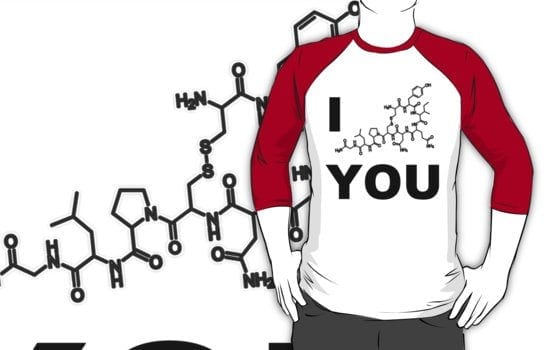Humans are unique. We supposedly mate for life, which enables two parents to healthfully share the raising of kids. Nature is all about the next generation. About the next generation being healthy and safe. In this way, nature is extremely invested in having us stay together. Healthy monogamy makes healthier homes and kids.
So what mechanisms did nature set into place to try to safeguard monogamy?
Pleasure! Nature set it up that the more healthy intimacy and interpersonal closeness between couples—through harmonious communication, touch, hugging, and love-making—turns out to be key factors toward making love stay.
How this works on the biological brain level has not been well known… up until now.
A randomized, placebo-controlled trial was published by six different prestigious research institutes from Germany and Bethesda, Maryland. This unique study was designed like this: 192 healthy volunteers—96 heterosexual couples—were given oxytocin nasal spray or placebo nasal spray. The specific dosage of oxytocin was the most commonly used dosage in oxytocin research (24 IU) given to both males and females, several times a day.
Brain MRI scans were run on the participants while they assumed they were being touched by their romantic partners or by an unfamiliar person of the opposite sex. In reality, touching was performed by researchers.
What happened? The oxytocin nasal spray, compared to the placebo, made both men and women to experience the touch as much more pleasing compared to the placebo nasal spray.
When persons experienced pleasure from touch with oxytocin robustly signaling in their brain, this turned on specific bonding areas in the brain. It nudged areas that make one feel good about the relationship, about the partner, and promoted feelings of monogamy. Of wanting to make love stay.
Oxytocin hormone contributes to the maintenance of monogamous relationships by increasing the reward value of a partner’s touch. It also diminishes the hedonic quality of a stranger’s touch. And even makes “others” look less appealing.
Oxytocin makes us want to stray less. It makes us want to spend more time in the bedroom. When we come out of the bedroom, we long to create and thrive within a more stable family.
Kids feel this stability. All these events translate into a safer and healthier environment for them.
However, the ground rules for life today have changed. We live in a dirty world. There are more than 80,000 chemicals in commerce, of which less than 2% have been tested for their ability to futz with our hormones, including oxytocin. All of us are exposed 24/7 to endocrine-disrupting compounds. Just like there are estrogen and androgen endocrine disruptors, there are also oxytocin disruptors. They make our oxytocin receptors less welcoming to oxytocin signals, and thus less responsive to rewarding interpersonal intimacy and touch.
It’s shocking, but today’s toxic environment is invading our bedrooms. It’s even invading our children and their brain tissue. There are discussions that Pitocin, which is synthetic oxytocin often given in labor to speed up childbirth, disrupts the oxytocin receptor in kids. This may be part of the rising epidemic of kids with behavioral and attentional disorders like ADHD, autism, Asperger’s syndrome, and impulsivity control, as well as anxiety and depression. All these issues are happening more and more to younger and younger kids.
Bisphenol A, the chemical that lines all food cans (even organic) and is the white dental filling alternative to mercury-containing ones, is linked to brain changes in kids. It also dings monogamy. And family stability.
In practice I have been helping couples have more mutual enjoyment, along with more stable home life, using oxytocin nasal spray. I present protocols and nuances for using oxytocin in my new course. There are even studies and protocols for its use in certain conditions in children.
There are a few contraindications to oxytocin that you also learn in my new course.
Most of us now take nutraceuticals to protect our health, but rarely do we feel immediate boosts in energy and behavior from all these expensive pills and potions. But that’s not the case with oxytocin. In many cases oxytocin replacement, when done right, gives benefits that you can feel rapidly. There are some other conditions for which oxytocin replacement is beneficial, but may take many months to get the benefits. You’ll learn this in my new course, too.
Discover amazing information like this to make you a better practitioner, lover, or parent in my new online course:
Enrollment is closing soon!
The Sexy Brain™ And Hormone Course!
Everything you need to know about hormones and how they affect brain, gut health and intimacy. A complete course on today’s hormones in today’s dirty world, with information that most practitioners don’t (but should) know.
Here’s a link to sign up: https://drlindseyberkson.com/sexy-brain-course
I am also starting an affiliate program, if you are interested in making money while you inform your tribe, write me at dlberkson@gmail.com. Here is the affiliate link if interested: https://drlindseyberkson.clickfunnels.com/affiliate-login15130233/565c583bba0
FREE BERKSON WEBINAR: This coming Tuesday night.
I’m giving a webinar to introduce you to this new understanding of hormones, your brain and the environment.
- Tuesday night 7:30 PM Central Texas
- 5:30 PM Pacific,
- 6:30 PM Mt,
- 8:30 Eastern
Join here for FREE: https://zoom.us/webinar/register/01cbb4fb33eedcf7d746f627e8486654
Feel free to share.
Reference
Hum Brain Mapp. 2017 Jun 5. doi: 10.1002/hbm.23679. How the brain codes intimacy: The neurobiological substrates of romantic touch.

